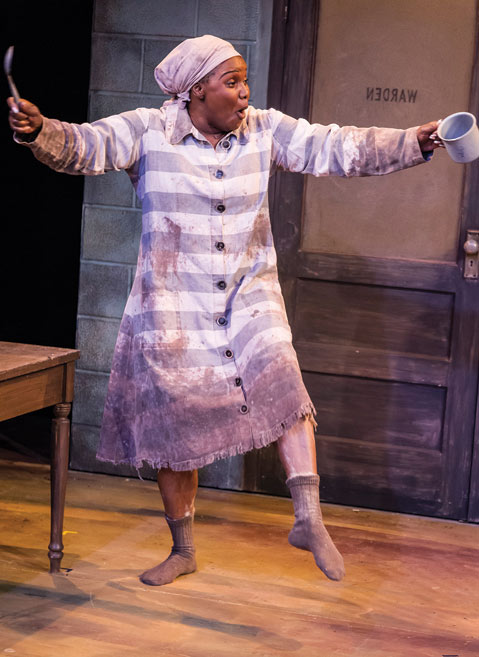Black Pearl Sings! at Alhecama Theatre
Play Explores Roots of African-American Music on Saturday, June 16
As one of President Obama’s favorite sayings goes, “The arc of the moral universe is long, but it bends toward justice.” So what if this grand pronouncement was not original to Martin Luther King Jr. but rather King paraphrasing Theodore Parker, an antebellum New England abolitionist? And even if the president both alters and misattributes the quote — as was widely reported back in September of 2010 — it’s the thought that counts, right? It’s precisely this thought of redemption over time that seems to hover in the air as Black Pearl Sings! unfolds at the hands of the Ensemble Theatre Company.
Frank Higgins’s two-woman play with music, directed by Patrick Mullins and starring Jannie Jones as Pearl and Jessica Wortham as Susannah, is nothing if not a study in hope. These two unlikely partners — a middle-aged white anthropologist and an older black woman doing hard time for murder — are thrown together when things look bleak for each of them. Susannah has offended the powerful men who control preferment in her academic profession and has been exiled to Texas, where she is collecting folk songs from prisoners. Pearl is a mother and an artist, but she’s been behind bars 10 years and has lost control of both her life and her precious 22-year-old daughter.

The play’s central conceit is a simple one, and for the most part, it serves the action well. Each of the two characters has a right to sing the blues, and they need each other. Susannah’s instrument of choice is an Autoharp, and Wortham does a great job using it and her voice to portray Susannah’s empathetic relationship to the people she has chosen to study. When Susannah meets Pearl’s challenge to trade songs with “When I Was Single,” a desperately sad Irish ballad to the tune of “Sweet Betsy from Pike,” the audience shares in Pearl’s sense of relief that this uptight scholar has some soul. And when Pearl comes back at her with “Little Sally Walker” and “Troubles So Hard,” the sense of having come into the presence of an authentic black voice becomes a shared one, as well.
As the action follows Pearl and Susannah out of the Texas prison of Act 1 and into the bright lights of New York City, certain problems develop, some having to do with the play, others having to do with the subject. Not every reversal is surely motivated, and there are times when the characters slip too quickly and easily from one position on an important issue to another without more than a moment’s reflection. But these plot-level issues dim in comparison to the questions that arise in the way that these two characters relate. Such early partnerships between folklorists and their subjects were fraught with mistrust and mutual misunderstanding, and although the play strives to imagine significant conflicts between Pearl and Susannah, there are several sequences in which both characters appear just too good to be true. Behind Susannah’s well-meaning exterior, there are good intentions, and beneath Pearl’s gruff surface, there’s — you guessed it — a heart of gold. Yet despite these limitations, both performances are strong, and the music of Black Pearl Sings! will linger in your mind long after the drama.



